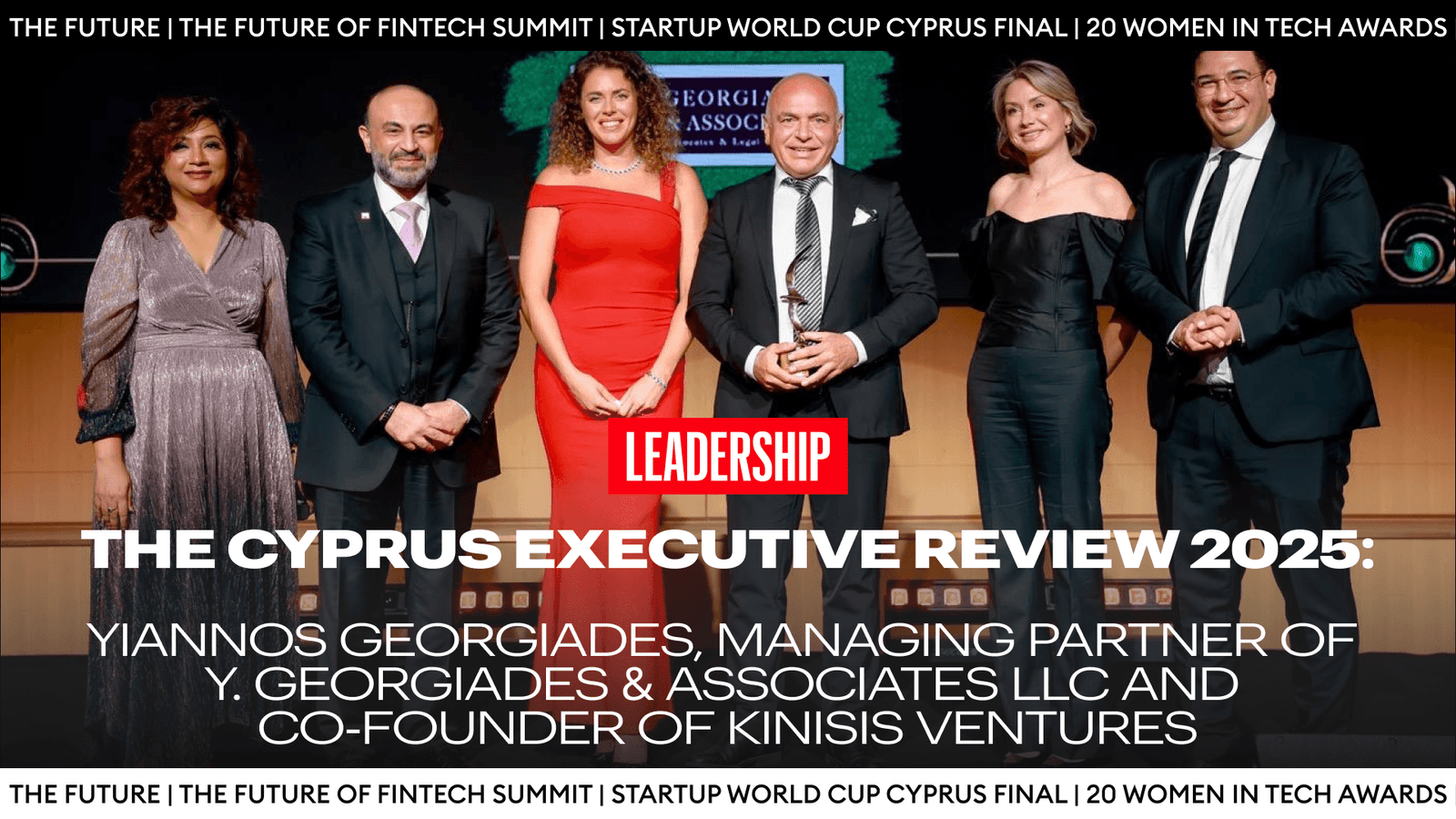Since 2022, the evolution of AI and AGI has changed the way industries leverage artificial intelligence. Cyprus, which has had an AI strategy since 2020, is now preparing to modernize and update it. The government has approached this challenge by pursuing a new direction: assembling a diverse National AI Taskforce chaired by Demetris Skourides, the country’s Chief Scientist for Research, Innovation & Technology.
In this exclusive interview for The Future Media, Skourides shares his views on where Cyprus should be investing and why AI is one of the most disruptive enablers across industries. He also discusses how the country can harness the AI opportunity to improve public services, while also positioning itself as a platform ecosystem for startups aiming to tap into the $330 billion AI market opportunity in Europe by 2030.
Follow THE FUTURE on LinkedIn, Facebook, Instagram, X and Telegram
What perspectives or expertise do you bring to the Taskforce that you believe will shape Cyprus’s AI future?
I come to this role after more than 17 highly successful years at Oracle, where I led cloud transformation and partner solutions engineering teams supporting independent software vendors in adopting cloud and emerging technologies across Europe, the Middle East, Africa, and Asia Pacific. During this time, and later at AWS, I gained first-hand experience in developing strategic partnerships and go-to-market strategies for industries.
Over the past seven years, particularly during my time at Oracle and AWS, I had the opportunity to lead programmes and industry GTM with global alliance partners such as Deloitte, Accenture, Infosys, and more than 100 global ISVs. These partners invested in developing industry solutions leveraging machine learning and computer vision in industries including finance, retail, automotive, shipping, maritime, defense, space, healthcare, consumer goods, and manufacturing.
With a deep understanding of both public service policy formulation and how the private sector adopts technology at scale, I bring best-in-class experience in harnessing technology trends and aligning them to business needs. This includes adopting technology and scaling across industries, and, more importantly, navigating AI ethics, transparency, and explainability to help create an AI adoption playbook that supports Cyprus’s implementation of the EU AI Act.
AI does not work in isolation. It requires data, connectivity, infrastructure, digital skills, substantial investments in R&D, and a commercially minded GTM mindset. I am particularly focused on strengthening Cyprus’s capacity in four areas: research innovation, industrial technology adaptation, data infrastructure, AI, and cloud infrastructure. Without these foundations, we cannot scale AI responsibly or competitively, nor can we co-create value with startups and entrepreneurs who choose Cyprus as their home and gateway to Europe.
My vision is to lay the foundations for an “AI-first” environment and ecosystem in which Cyprus can serve as a regional hub, not only by using AI but by enabling others to build with it, co-create value, and generate new revenue streams. This must be done without compromising ethics, workforce wellbeing, or our commitment to reducing CO₂ emissions. To achieve this, we must move away from incremental steps and think big.
The path forward requires us to prepare for the unknown and to build sovereign AI and innovation ecosystems. We must evolve our perspectives on traditional data management strategies to support data science and develop cloud infrastructure policies that support startups and cross-border collaboration. To achieve the scale required to realize our Cyprus Vision 2035, we must build bridges with other innovation ecosystems, both regionally and internationally.
These new ecosystems will not only create economies of scale for AI adoption. They will also accelerate the pace at which new AI startups from Cyprus launch and expand their operations and partnerships globally. The journey ahead requires us to rethink and re-imagine how services will be consumed by citizens and businesses by 2035.
Since 2022, much of the world’s attention has turned to Generative AI. However, with the accelerating pace of technological advancement, we can now envision generative AI, agentic AI, and computer vision being combined to reinvent industries in ways we have yet to imagine. That is the challenge ahead of us.
In your view, what qualities or achievements made you a strong candidate for this national role at such a transformational moment in AI development?
As someone who has worked across industries with corporations since 2008, spearheading technology adoption by ISVs and SIs, I have gained first-hand enterprise experience and global learnings from both successful and failed adoption cycles in analytics, big data, engineered systems, cloud, blockchain, IoT, and AI.
Over the years, I have collaborated with governments and major customers, ISVs, and partners, including Temenos, Nokia, Telekom Italia, Telefónica, BMW, Lufthansa, Smart Dubai, Dassault, Samsung, Emirates, and the top 20 banks in the region, as well as value-added distributors.
Adding to that is my experience in product development, consulting, implementation, research, innovation, and large-scale infrastructure design. This enables me to understand not only how to use AI effectively, but also how to modernize the National AI strategy and create the necessary enablers for Cyprus to adopt AI at scale.
Adopting artificial intelligence is not just about technology. It’s about strategy and value creation.
I believe my established track record in navigating institutional challenges and regulatory requirements, while guiding multimillion-euro digital transformation projects and delivering rapid technology adoption cycles such as the 12-partner Cloud Center of Excellence rolled out across EMEA and APAC in under 12 months, equips me with the knowledge, expertise, confidence, resilience, wisdom, and grit required to succeed in this role.
Since assuming this role in September 2023, I have prioritized industry engagement, hosting over 1,100 meetings in 19 months to accurately map Cyprus’s AI adoption landscape. I have also acted as a bridge, connecting AI knowledge and proof-of-concepts developed in centers of excellence and research institutions with industry and startups.
Among my key achievements:
- The migration and adoption of Oracle Cloud Infrastructure, bringing to market more than 1000 ISVs and system integrators to Oracle’s Marketplace portal
- Creating a systematic methodology for go-to-market and commercialization success that was replicated in Asia Pacific
- Spearheading the adoption of Oracle’s autonomous data warehouse solution by the top 20 analytics partners in EMEA in under one year.
Since assuming my role as Chief Scientist, I have led discussions and accelerated the establishment of Memoranda of Understanding (MoU) with Japan, Israel, and the UAE, while positioning Cyprus for cooperation with Singapore, the USA, and India. These efforts have attracted major investments to Cyprus, most notably NASA’s involvement as a partner in the world’s first space research innovation center, CSPARK, placed under the joint auspices of COSPAR and the Chief Scientist of Cyprus.
In addition to guiding Cyprus’s digital future roadmap and outlining the vision behind the country’s data center play, I have also spearheaded engagements with strategic AI hardware players such as Tenstorrent, AI startups like bCentrique in Silicon Valley, and quantum technology companies in Singapore and the UAE. Several of these are exploring potential operations in Cyprus.
These actions reflect what I believe to be Cyprus’s most aggressive and globally focused approach to internationalization. They have led to new opportunities and MoUs with some of the world’s most advanced technology nations, including Israel, Japan, and the UAE, where the recent MoU was signed by the Deputy Ministry of Digital Policy of Research, and Innovation during the 2025 World Government Summit. Discussions with the USA, Singapore, and India are also underway, including strategic conversations with hyperscalers, tier-2 system integrators, and startups interested in opening offices in Cyprus.
My experience, global network, credibility, and reputation in developing more than 1,000 solutions on Oracle’s Partner Cloud Marketplace, along with my ability to open doors for Cyprus globally, my extensive mastery of AI from both industrial and research perspectives, and the existing mandate from the President on AI and emerging technologies, make me the ideal candidate to advance Cyprus’s AI strategy.
That said, meaningful impact can only be achieved through collaboration at both the policy and industry levels. I am grateful for the support of colleagues and peers across government and industry who have helped turn every conversation and partnership into a success for Cyprus.
What AI-driven opportunities do you see as most transformative for Cyprus’s key sectors, such as tourism, energy, or healthcare, and society as a whole?
AI can and will transform every sector. However, over the next five years, we will see use cases focused on productivity improvement, operational efficiency, and enhanced customer experience across both the private and public sectors. To ensure successful adoption without risking millions in failed projects, we must design for scale, address AI ethics, bias, and transparency challenges, and prioritize use cases where AI can deliver measurable value.
In Cyprus, significant opportunities exist in tourism, healthcare, the Ministry of Finance, road transportation and communication, the Deputy Ministry of Digital Policy, the Ministry of Agriculture, Labor, the Research and Innovation Foundation, and the Office of the Commissioner of Communications and Cybersecurity. In the private sector, promising industries include gaming, media, financial services, healthtech, spacetech, maritime, shipping, and retail. We also anticipate a major increase in automation and the implementation of robotic process automation (RPA) solutions.
Agentic AI will be a game changer in accelerating how companies benefit from AI. However, given that Cyprus is still at the early stages of this journey, we must first leverage “low-hanging fruit” use-cases such as RPA, followed by select AI applications per industry, in order to build operational excellence.
How can Cyprus align its AI development with global trends while overcoming challenges like a small market size to attract global investment and attention?
Cyprus can compete on speed, sovereignty, flexibility, and innovation. We are preparing to implement a cloud-first policy to drive government adoption, followed by mobile-first and AI-first strategies set to commence in 2028.
These strategies will not only accelerate AI adoption but also transform the value created both upstream and downstream in the value chain, thus enabling the government to support personalized citizen services based on user preferences.
To achieve this, we must develop the capabilities to build and deploy sovereign data and sovereign AI cloud services that integrate with existing information systems. We are leveraging EU-funded programmes such as AI Factories and research infrastructures like SLICES, and we aspire to establish sovereign infrastructure and AI competency centres to support initial deployment and testing pilots. This will allow us to advance our AI readiness and increase technology intensity without compromising intellectual property.
These elements are non-negotiable if Cyprus is to become a regional hub for technology, innovation, and research. We believe that hyperscalers and AI-savvy startups will choose Cyprus not only for its tax and funding advantages but because of its trusted relationships with both the EU and the Middle East, providing access to a market projected to exceed $600 billion in AI adoption by 2030.
How can Cyprus attract and retain top AI talent to drive its innovation agenda?
Talent is critical. We cannot build a future-ready AI ecosystem without investing in people. This means designing educational programmes, supporting researchers, and creating compelling reasons for startups and technologists to build their futures in Cyprus.
Currently, the Human Resources Development Authority offers cloud-specific training, with vendors providing access to AI fundamentals as part of their cloud practitioner and professional certification tracks. In addition, the Deputy Ministry of Digital Policy, Research and Innovation, which oversees digital skills, along with the Centres of Excellence, are offering specialized AI workshops to accelerate market readiness. New system integrators like LTIMindtree, which recently opened an office in Cyprus, are also planning to establish dedicated AI teams.
I believe there has never been a more important time for employees to embrace AI as a tool to develop “AI superpowers” that enhance effectiveness, productivity, and competitiveness. This will require reskilling or upskilling for executive assistants, researchers, engineers, leaders, and educators. AI will fundamentally transform how value is created and captured, making it essential to foster a culture of continuous learning.
As I have repeatedly voiced during my conversations with AI thought leaders: to succeed in the era of AI, nations must execute efficiently and effectively and remain focused on the long game. The slower a country invests and prioritizes early on, the less likely it is to catch up and the harder it will be to attract top talent over other, faster-moving nations!
What are the biggest risks associated with AI integration in Cyprus, and how can the Taskforce proactively address them?
One of the biggest risks is fragmentation: disconnected systems, inconsistent data, and regulatory uncertainty. AI doesn’t work well in silos. Poor data integration leads to weak models, inaccurate predictions, and a lack of trust.
Another challenge is that our current AI capacity remains medium to average, both in the public and private sectors, particularly when it comes to the experience required to develop full, secure, and enterprise-grade AI applications with proper safeguards.
That is why we are pushing for a unified data infrastructure through government-led data management projects, secure cloud environments, and a legal framework that promotes transparency and accountability.
We are aligning with the EU AI Act to define clear risk classifications and use-case thresholds while emphasizing ethics, transparency, and human oversight in critical decisions.
Ultimately, success depends on building a roadmap that supports the implementation of AI use cases across both sectors and on resourcing the best-equipped organizations and actors to spearhead the adoption. In studying other countries, we have observed the decentralization of roles and responsibilities paired with strong efforts to accelerate AI adoption, and the re-purposing of financial investments required to support these strategic “must-win” battles.
The Taskforce has a challenging role. Amongst its priorities is incorporating industry input, recognizing each sector’s maturity level, and creating the right conditions for ecosystem-wide scaling. It must also proactively rethink how AI will impact the workforce of the future, and define the role Cyprus can play as the central piece, either as part of trilateral collaboration or through broader multilateral collaborations.
What is the one thing you hope to achieve during your term on the Taskforce?
If I can help create an environment where Cyprus becomes a regional hub for AI innovation, a place where SMEs and large enterprises embrace RPA, generative AI, and agentic AI, and where startups, researchers, and companies launch global solutions built in Cyprus, then I will consider that a partial success.
But infrastructure is just as important. If we get our data centres, cloud policies, and cross-border systems right, we will lay the foundation for everything else that follows. I also aspire to introduce Europe’s first digital advisor for the Office of the Chief Scientist and make it available to ministers and technocrats, easing their generative-AI adoption cycle without compromising sensitive information. In addition, I aim to launch AI-adoption workshops across ministries focused on productivity gains and on identifying ten key examples where citizen services can be improved, and to introduce the idea of government-sponsored AI hackathons
To summarize, success would mean:
- Producing a strategic document that serves as the blueprint for the next five years, aligning all AI investments across industries and raising adoption to >25% by 2028 (up from 3% in 2023).
- Building the required infrastructure for AI and DATA needed by entrepreneurs, innovators, scientists, researchers, and the public sector.
- Establishing clear recommendations for developing the workforce of the future.
- Delivering a series of public-sector firsts, including a Digital Advisor for the Chief Scientist and science-for-policy ministerial personnel.
- Launching a regional AI conference in Cyprus that unites research, policy, and industry and attracts top-tier speakers.
- Contributing directly to the FDI and growth of the GDP of the country by attracting AI-native startups to Cyprus.
What steps is the Taskforce taking to ensure that Cyprus’s AI strategy is resilient to international shifts in regulations and technology trends?
We are building for adaptability. This means not only complying with EU regulations but also engaging with partners beyond Europe to stay ahead of emerging trends.
The AI sandbox we are launching will allow us to test new tools in a controlled environment. Our cloud-first, AI-first strategy is designed with enough flexibility to respond to shifts in both technology and policy.
We are also collaborating with other countries and international organizations to align on standards so that Cyprus remains interoperable and competitive even as global frameworks evolve.
What does success look like for Cyprus in AI by 2030?
Success means Cyprus is no longer a follower but a leader. A country where startups scale globally, researchers choose to stay, and AI is fully integrated into public services.
It’s also about impact. If we can improve productivity in key departments by up to 25%, enhance quality of life, and build a sustainable digital economy, then we have achieved our goal.
Our vision extends to 2035, but the foundation is being laid today. Designing the right building blocks, policies, and tools to execute this vision will ultimately determine our success.














